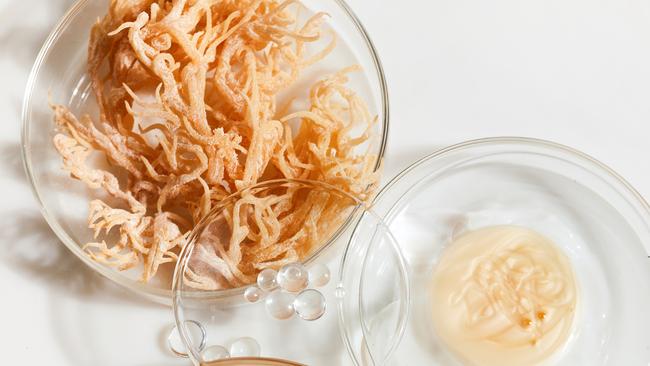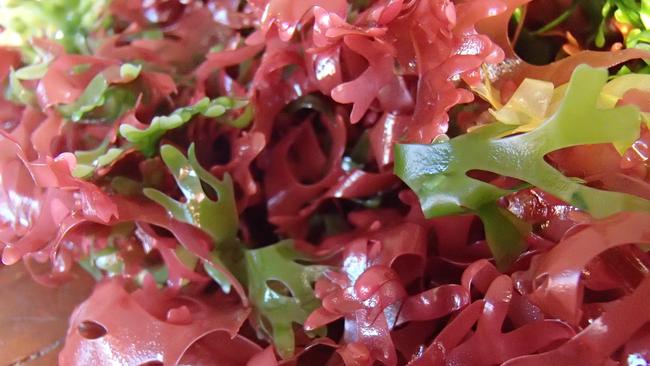Sea moss: The health world’s latest obsession explained
From gut health to a strengthened immune system, this trending sea vegetable claims to do it all. But is it all hype or is this slimy substance your new health hero?

From Hailey Bieber’s collaboration with the upscale supermarket Erewhon to launch a supplement-filled smoothie to Kevin Hart and Mark Cuban’s $902,460 investment in The Transformation Factory’s sea moss gel on Shark Tank, and most recently, Michael B. Jordan’s sea moss-infused health drink, MOSS, sea moss is everywhere right now.
Over on TikTok, Australian creators are accumulating over three million views on their sea moss review videos. In the videos, they sniff and slurp the slimy substance while curious viewers ask questions such as “does it smell like the ocean?” and “how does sea moss taste?”
So, why are many people turning to sea moss gel? Despite its slimy appearance, sea moss is believed to offer numerous health benefits, such as boosting collagen and improving complexion. But are these claims supported by science, or is sea moss, dare we say it, simply a slimy scam?
Before adding sea moss to your daily routine, here’s everything you need to know.
What is sea moss?
Sea moss, also known as Irish Moss, Red Seaweed or Jamaican Moss, is a nutrient-rich sea vegetable similar to seaweed and kelp.
“Sea moss is a good source of vitamins such as A, B1, B2, B9, C, D, E, and K,” explains Dr Emily Burch, an accredited practising dietitian and nutritionist. “It also contains essential minerals, including calcium, iron, iodine, magnesium, phosphorus, potassium, zinc, copper, manganese and selenium. Additionally, sea moss provides dietary fibres, small amounts of protein, essential amino acids and polyphenols.”
“Like anything, the levels of these nutrients and their bioavailability will vary depending on the circumstances in which it was grown and the storage, handling and processing of the product.”
But according to Burch, you’ve probably been eating small amounts of sea moss for years without even realising it. “Sea moss is used to thicken foods because it contains carrageenan, which is a natural thickening agent used in chocolate milk, as a binder in processed deli meats like ham and salami and as a vegan alternative to Gelatin.”

What are the health benefits of sea moss?
Jess Redman and Benji Dimitrioski, co-founders of Natures Farmer Sea, say consuming sea moss has many health benefits, including improved gut health, reduced inflammation, better focus, enhanced immune strength, and increased energy.
“Our immune system strength decreases with poor nutrition, emotional stress and environmental toxins,” explains Dimitrioski. “Sea Moss gel allows our body to replenish with almost all the minerals we require, making it a powerful, raw and alkaline food that is alive and fresh, allowing our body to absorb it faster and easier.”
However, while seaweed, in general, has been well researched, there are no clinical trials that have investigated whether sea moss is specifically beneficial to humans. “Recent prospective studies — research where scientists follow a group of people over time to observe and collect data on specific factors — have found associations between seaweed intake and lower mortality as well as decreased risk of developing colorectal cancer, metabolic syndrome, cardiovascular disease and osteoporosis,” says Burch. “Higher quality evidence is needed to confirm these findings.”
Burch explains that while there is no strong evidence supporting the claim that sea moss enhances immune system functioning, some studies suggest that certain fatty acids and vitamins, such as omega-3, vitamin D, and B12, found in some seaweeds, may help strengthen the immune system.
But sea moss does contain prebiotic fibre, which helps regulate the digestive system by serving as a food source for beneficial bacteria. These bacteria then produce short-chain fatty acids, according to Burch. In one study, rats supplemented with Irish Moss showed improvement in gut health and immune modulation. However, these findings have yet to be replicated in humans.
Can sea moss improve your complexion?
“Inflammation is one of the root causes of skin conditions, and it occurs for different reasons, like stress, poor diet, or environmental toxins,” says Dimitrioski. “Sea moss is rich in antioxidants which help neutralise substances that contribute to inflammation in the skin,” he says. Additionally, it is rich in minerals like zinc, selenium, and copper, which support skin health. Dimitrioski also claims that sea moss can naturally support collagen production in our skin.
What is the best way to consume sea moss?
Redman suggests consuming sea moss in gel form because he believes it’s the freshest and most bioavailable way to absorb all its nutrients.
Although there is no recommended daily intake for consuming sea moss, Burch cautions that she wouldn’t recommend taking more than two tablespoons a day due to its high iodine content.

Is sea moss worth adding to your diet?
The jury is still out on whether sea moss will have a noticeable impact on your health and wellbeing. “If you’re already prioritising whole foods and a balanced diet, you’re already getting a great nutritional foundation and the need for popular superfoods is not necessary,” says Burch. “Some of the best foods for us are things like beetroot, cabbage, swiss chard, cinnamon, pumpkin seeds, sardines, turmeric and blueberries.”
Whether it’s spoonfuls of sea moss or simply incorporating more fruits and vegetables into your meals, adding variety and boosting certain areas of your diet is almost always a good idea.



